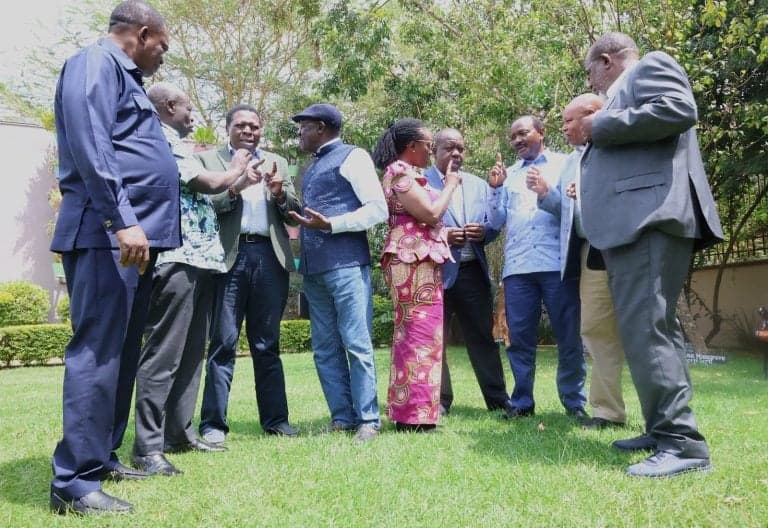We're loading the full news article for you. This includes the article content, images, author information, and related articles.
Mukurweini MP John Kaguchia has cautioned Kenya's united opposition against internal divisions, asserting that their strength lies in public demand rather than individual leaders. He warned that a leader-driven approach could lead to rejection by voters in the 2027 general election.

Nairobi, Kenya – Mukurweini Member of Parliament John Kaguchia has issued a stern warning to the current united opposition, emphasising that their cohesion is rooted in public demand, not individual leadership. Speaking during a recent interview on a local television station, Kaguchia, a known ally of former Deputy President Rigathi Gachagua, stated that any internal divisions or an overreliance on individual leaders would be met with disapproval from the electorate in the lead-up to the 2027 polls.
“These leaders in opposition must again work together. If the opposition becomes leader-driven rather than people-driven, it will have to be dealt with one way or another,” Kaguchia asserted. His remarks highlight growing concerns within political circles regarding the opposition's strategy and unity as the next general election approaches.
The Kenyan opposition has been actively working towards forming a formidable coalition to challenge the incumbent government in 2027. This push for a united front comes amidst a shifting political landscape, with new presidential aspirants emerging and discussions around the potential exit of former Prime Minister Raila Odinga from local politics as he eyes the African Union Commission (AUC) chairmanship. Despite Odinga's international ambitions, his influence continues to loom over local politics, with speculation about a possible pre-election alliance between his Orange Democratic Movement (ODM) and President William Ruto's United Democratic Alliance (UDA).
Several opposition figures have expressed commitment to supporting a single candidate. Martha Karua, leader of the People's Liberation Party (formerly Narc Kenya), has affirmed that the opposition will back one flagbearer in 2027, stating, “Let every aspirant grow their brand knowing at the back of their mind that Kenya is bigger than any one of us and that towards the end, we will all converge and agree on a single candidate to ensure #RutoMustGo.” Karua recently met with former Deputy President Rigathi Gachagua, and both agreed to collaborate with a focus on national interests ahead of 2027.
Analysts suggest that the ongoing developments within the opposition could significantly influence public debate and policy execution in the near term. There is a clear call from stakeholders for clarity on timelines, costs, and safeguards related to the opposition's unity efforts. Public opinion on the likelihood of the opposition uniting behind a single candidate for 2027 is almost evenly split, with 32 percent believing it is 'very likely' and 26 percent 'somewhat likely,' while 30 percent express doubts.
A recent Trends and Insights for Africa (TIFA) survey, conducted between August 23 and September 3, 2025, among 2,024 adults across all 47 counties, indicated that over half of Kenyans oppose President William Ruto's re-election, with only 32 percent expecting or supporting his second term. The survey also highlighted divided opinions on Raila Odinga's future role, with 23 percent wanting him to rejoin the opposition and run for president, 17 percent preferring him to support another opposition candidate, and 14 percent believing he should retire.
The primary risk for the opposition, as highlighted by MP Kaguchia, is internal fragmentation. A failure to present a united front could dilute their collective strength and voter appeal, potentially benefiting the incumbent. Conversely, a cohesive, people-driven opposition could galvanise significant public support, especially given the public's divided sentiment regarding the current administration. The ongoing discussions about a potential alliance between ODM and UDA could further complicate the opposition's unity efforts.
Observers will be closely monitoring the opposition's progress in forming a unified coalition and selecting a single presidential candidate. The role of key political figures like Raila Odinga and Rigathi Gachagua, and their influence on the opposition's strategy, will be crucial. The outcome of ongoing coalition-building talks and public reception to these alliances will be key indicators of the political landscape leading up to the 2027 general election.
Keep the conversation in one place—threads here stay linked to the story and in the forums.
Sign in to start a discussion
Start a conversation about this story and keep it linked here.
Other hot threads
E-sports and Gaming Community in Kenya
Active 9 months ago
The Role of Technology in Modern Agriculture (AgriTech)
Active 9 months ago
Popular Recreational Activities Across Counties
Active 9 months ago
Investing in Youth Sports Development Programs
Active 9 months ago
Key figures and persons of interest featured in this article